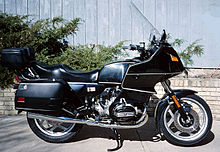This article needs additional citations for
verification. (April 2008) |


The BMW 247 engine is an air-cooled flat-twin motorcycle engine with two valves per cylinder, also known as " airhead" boxer. The 247 engine was the successor of the in 1969 (MY 1970) introduced first modern BMW boxer engine; the BMW 246 engine of the /5 series. With minor and more significant updates (247/76 in 1976 and 247/M80 in 1981) it was used by BMW beginning with the 1974 /6 series in its motorcycles from 1974 to 1995.
Before 1981 the ignition was points ignition. From 1981, introduced in the R80G/S it used electronic ignition, Nikasil cylinders, and a lighter flywheel. [1]
A number of different models were on the market:
- CS: the Classic Sport, with a 1,000 cc (61 cubic inches) engine.
- GS: Gelände/Straße - winner of a number of the Dakar rallies.
- RS: Renn (Racing) Sport
- RT: Road Touring
- S: with the R90S
- ST: [Straße]. An 800 cc (49 cubic inches) road-styled G/S.
Subsequent to the type 247 motor, BMW also built other air-cooled flat twin engines known as the Typ 248/1 used for the R45, the R65 and the R65LS BMW motorcycles. Before that they built side-valve and OHV engines commencing with the R32 of 1923. After the type 247, BMW substantially changed the engine design to include partial oil cooling and four valves per cylinder, a design which was to become known as the " oilhead".
References
- ^ Falloon, Ian (November 2003). The BMW story: production and racing motorcycles from 1923 to the present day. Sparkford, England: Haynes Publishing. p. 85. ISBN 978-1-85960-854-8.
This article needs additional citations for
verification. (April 2008) |


The BMW 247 engine is an air-cooled flat-twin motorcycle engine with two valves per cylinder, also known as " airhead" boxer. The 247 engine was the successor of the in 1969 (MY 1970) introduced first modern BMW boxer engine; the BMW 246 engine of the /5 series. With minor and more significant updates (247/76 in 1976 and 247/M80 in 1981) it was used by BMW beginning with the 1974 /6 series in its motorcycles from 1974 to 1995.
Before 1981 the ignition was points ignition. From 1981, introduced in the R80G/S it used electronic ignition, Nikasil cylinders, and a lighter flywheel. [1]
A number of different models were on the market:
- CS: the Classic Sport, with a 1,000 cc (61 cubic inches) engine.
- GS: Gelände/Straße - winner of a number of the Dakar rallies.
- RS: Renn (Racing) Sport
- RT: Road Touring
- S: with the R90S
- ST: [Straße]. An 800 cc (49 cubic inches) road-styled G/S.
Subsequent to the type 247 motor, BMW also built other air-cooled flat twin engines known as the Typ 248/1 used for the R45, the R65 and the R65LS BMW motorcycles. Before that they built side-valve and OHV engines commencing with the R32 of 1923. After the type 247, BMW substantially changed the engine design to include partial oil cooling and four valves per cylinder, a design which was to become known as the " oilhead".
References
- ^ Falloon, Ian (November 2003). The BMW story: production and racing motorcycles from 1923 to the present day. Sparkford, England: Haynes Publishing. p. 85. ISBN 978-1-85960-854-8.